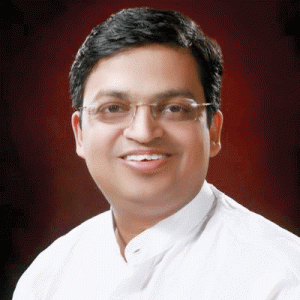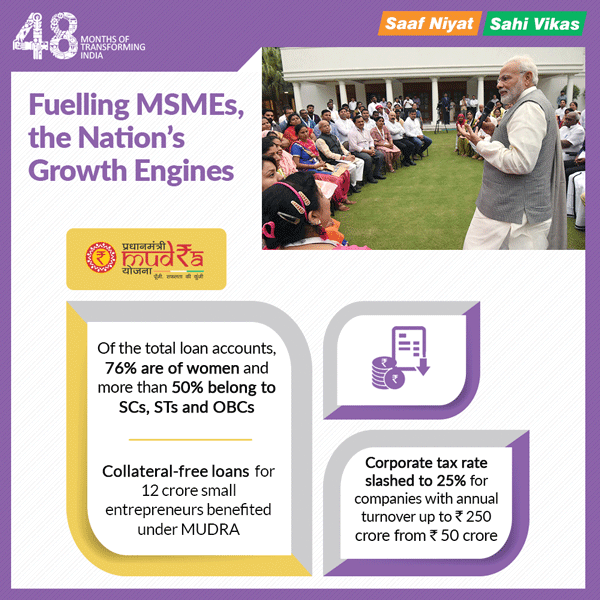
Gopal Krishna Agrawal
As we contemplate on completion of 4 years of first term of Modi Government in office, it is time to analyse the thought process that goes in the policies of the Government. The mandate to Shri Modiji was a big shift in Indian politics; it was a rejection of status quo in favour of transformative changes. He was voted to power for accelerating economic growth, corruption free environment and participative development.
The core of Modi government’s economic philosophy is fiscal responsibility, efficiency in government expenditure and policies that lead to empowerment over entitlement.
Within the ambit of the philosophy of ‘Antyodaya’, government is pro-poor. It is committed to take the challenge of slow economic growth and in equal distribution. The government works with innovation in implementation, a shift from the policy of entitlement followed by the UPA government.
Infrastructure development and allocation for economically disadvantaged segments of the society requires higher spending. Achieving it with reduced fiscal deficit calls for higher tax to GDP ratio. To meet this goal, the Goods and Services Tax (GST) was implemented, it is the biggest tax reform since independence. GST has been able to broaden the tax base and creating a system so that registration, filing, assessment, credit and refund are all done online with no scope for subjective intervention and harassment.
Inflation is tamed and fiscal deficit is controlled by the Government by taking strong policy decisions. The government has addressed corruption through steps like demonetization, direct benefit transfer (DBT), Jan Dhan Accounts and increased transparency in governmental working. Deregistration of Shell companies, renegotiation of bilateral tax treaties, Income Disclosure Schemes (IDS) and Benami Properties Act have also helped in this direction. Encouragement of all business transactions through banking channels is establishing a clear audit trail.
Insolvency and Bankruptcy Code (IBC) is one of the biggest reforms in the financial market. Promoters of defaulter companies are facing a real challenge of losing control over their companies. The successful resolution of the NPA of Bhushan Steel Limited under the IBC is a game-changer for the banking sector. Financial Regulation and Deposit Insurance (FRDI) Bill seeks to create an institutional setup to resolve distress in financial institutions.
The policy paralysis of UPA led to a disappointment in the international community about India’s future. The current government’s foreign policy has been a concerted attempt to dispel this image, to assure global community that India will realize its true potential. The trust of the global community is evident by the rising foreign direct investments (FDI) in India.
When it comes to the social dimension of its policies, Modi government’s focus is in scale, speed and mass mobilization to realise the objective of Social upliftment. ‘Swachh Bharat Abhiyan’ is to provide a life of dignity to the poor, irrespective of religion, caste or gender. ‘Beti bachao Beti padhao’ initiative of the government provides equality of status and opportunity to girl child. The government has been successful in creating awareness and public participation. Modi Government’s stand on Triple Talaq came from its conviction that the practice was grave injustice to Muslim women.
Political thought of ‘Sabka Saath Sabka Vikas’ translates to a government that values the support of every section of the society, which works for the development of all.
Our government is not guided by narrow electoral considerations. The difference with the working of the Congress led UPA is too obvious. The UPA during 2004 to 2014 tried to create divisions in the Indian society to reap electoral gains. It made attempts to pass ‘Communal Violence Bill’ that was against the Hindus, the Right to Education (RTE) Act exempted only the minority educational institutions from its ambit, creating an incentive for various sub-sects to dissociate from Hinduism. The UPA government had constituted Sachar Committee for Muslims and was trying to make changes, which were extra-unconstitutional. A fabricated narrative in the name of ‘Saffron Terror’ was developed by Congress government in order to consolidate Muslim votes.
Modi government firmly believes that responsive and effective governance ensures electoral success. Thus far the government is concerned it respects the mandate of the people by focusing on doing its job. It believes that good economics is good politics. Unlike the earlier governments, Modi government has not created vested interest for limited number of people in its continuation. The government has higher benchmarks and evaluation matrix for accountability and is willing to present its report card on its performance. The success of BJP in the state elections since 2014 bear testimony to the fact that Modi government is reaping political rewards for its work at the Centre.
(The writer is National Spokesperson of BJP on Economic Affairs)


